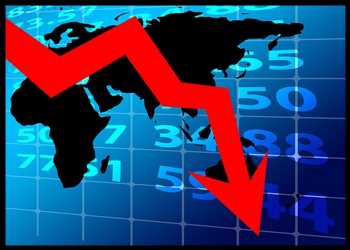
Asian Markets Mostly Lower On Global Cues
October 6, 2022Asian stock markets are trading mostly lower on Friday, following the broadly negative cues from global markets overnight, on growing fears of a recession amid persistently high inflation, rising interest rates and slowing global growth. Buying interest generated by the Bank of England’s bond market intervention quickly evaporated as traders quickly cashed in on the gains. Asian markets ended mostly higher on Thursday.
The Australian stock market is significantly lower on Friday, giving up some of the gains in the previous session, with the benchmark S&P/ASX 200 falling to nearly the 6,500 level, following the broadly negative cues from global markets overnight, dragged by weakness in financial and technology stocks, partially offset by gains in mining stocks.
The benchmark S&P/ASX 200 Index is losing 47.40 points or 0.72 percent to 6,507.60, after touching a high of 6,563.20 earlier. The broader All Ordinaries Index is down 52.80 points or 0.78 percent to 6,707.08. Australian markets ended sharply higher on Thursday.
Among major miners, OZ Minerals, Mineral Resources and Fortescue Metals are edging down 0.2 to 0.5 percent each, while Rio Tinto is gaining more than 2 percent and BHP Group is adding almost 2 percent.
Oil stocks are mixed. Origin Energy is losing more than 1 percent, while Beach energy is gaining almost 1 percent and Woodside Energy is edging up 0.3 percent. Santos is flat.
Among tech stocks, Afterpay owner Block and Zip are losing more than 4 percent each, while Xero is slipping almost 4 percent, WiseTech Global is declining more than 3 percent, Appen is sliding almost 5 percent and Zip are losing more than 2 percent.
Among the big four banks, National Australia Bank and ANZ Banking are edging down 0.4 to 0.5 percent each, while Commonwealth Bank and Westpac are losing almost 1 percent each.
Gold miners are strong. Newcrest Mining and Gold Road Resources are gaining almost 2 percent each, while Resolute Mining is surging more than 5 percent, Northern Star Resources is adding almost 3 percent and Evolution Mining is up 2.5 percent.
In the currency market, the Aussie dollar is trading at $0.649 on Friday.
The Japanese stock market is sharply lower on Friday and slid back to three-month lows, giving up the gains in the previous session, with the benchmark Nikkei 225 falling more than 400 points to below the 26,000 mark, following the broadly negative cues from global markets overnight, dragged by weakness across most sectors, led by technology and financial stocks, amid growing fears of a recession and rising interest rates.
The benchmark Nikkei 225 Index closed the morning session at 25,979.75, down 442.30 points or 1.67 percent, after hitting a low of 25,929.01 earlier. Japanese stocks closed significantly higher on Thursday.
Market heavyweight SoftBank Group is losing more than 1 percent and Uniqlo operator Fast Retailing is declining almost 4 percent. Among automakers, Honda is slipping almost 3 percent and Toyota is losing more than 3 percent.
In the tech space, Advantest, Screen Holdings and Tokyo Electron are losing more than 3 percent each.
In the banking sector, Mizuho Financial is losing almost 1 percent, Sumitomo Mitsui Financial is declining 1.5 percent and Mitsubishi UFJ Financial is slipping almost 2 percent.
Among major exporters, Canon and Mitsubishi Electric are edging down 0.3 to 0.4 percent each, while Panasonic is losing almost 1 percent and Sony is declining more than 2 percent.
Among the other major losers, Mazda Motor is plummeting almost 8 percent, Mitsubishi Motors is plunging almost 7 percent, Subaru is sliding more than 6 percent and Denso is slipping almost 6 percent, while Nissan Motor and IHI are losing more than 5 percent each. Minebea Mitsumi and Kawasaki Heavy Industries are declining more than 4 percent each, while Isuzu Motors, NTN, Sumco and JTEKT are down almost 4 percent each.
Conversely, Unitika is gaining almost 5 percent.
In economic news, the unemployment rate in Japan came in at a seasonally adjusted 2.5 percent in August, the Ministry on Internal Affairs and Communication said on Friday. That was in line with forecasts and down from 2.6 percent in July. The participation rate was 62.9 percent – matching forecasts and unchanged from the previous month.
The total value of retail sales in Japan was up a seasonally adjusted 1.4 percent on month in August, the Ministry of Economy, Trade and Industry or METI, said on Friday. That beat forecasts for an increase of 1.0 percent following the downwardly 0.7 percent gain in July (originally 0.8 percent). On a yearly basis, retail sales improved 4.1 percent – again beating expectations for a gain of 2.8 percent and up from 2.4 percent a month earlier.
The METI also said industrial production in Japan was up a seasonally adjusted 2.7 percent on month in August. That beat forecasts for an increase of 0.2 percent and was up from 0.8 percent in July. On a yearly basis, industrial production climbed 5.1 percent, exceeding expectations for a gain of 2.0 percent following the 1.8 percent contraction in the previous month.
In the currency market, the U.S. dollar is trading in the higher 144 yen-range on Friday.
Elsewhere in Asia, New Zealand is plunging 1.6 percent, while Taiwan and Indonesia are down 1 percent each. China, Singapore and Malaysia are lower by between 0.1 and 0.4 percent each. South Korea is bucking the trend and it up 0.2 percent. Hong Kong is relatively flat.
On Wall Street, stocks showed a substantial move back to the downside during trading on Thursday after moving sharply higher over the course of the previous session. he major averages largely offset Wednesday’s gains, with the S&P 500 once again falling to its lowest closing level since late 2020.
The major averages climbed well off their worst levels going into the close but continued to post steep losses. The Dow slumped 458.13 points or 1.5 percent to 29,225.61, the Nasdaq plunged 314.13 points or 2.8 percent to 10,737.51 and the S&P 500 tumbled 78.57 points or 2.1 percent to 3,640.47.
The major European markets also all showed notable moves back to the downside. While the French CAC 40 Index slumped 1.5 percent, the German DAX Index and the U.K.’s FTSE 100 Index tumbled by 1.7 percent and 1.8 percent, respectively.
Crude oil prices fluctuated over the course of the trading day on Thursday before closing lower on concerns about the outlook for energy demand amidst a possible global recession. West Texas Intermediate for November delivery slid $0.92 or 1.1 percent to $81.23 per barrel.
Source: Read Full Article


